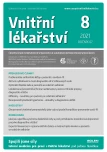-
Medical journals
- Career
Bilateral multiple pneumatocele as a rare late complication of COVID-19 pneumonia
Authors: Samuel Genzor 1; Jan Mizera 1; Milan Sova 1,2; Shayan Nadjarpour 3; Petr Jakubec 1
Authors‘ workplace: Klinika plicních nemocí a tuberkulózy FN a LF UP Olomouc 1; Klinika nemocí plicních a tuberkulózy FN a LF MU Brno 2; Lékařská fakulta Univerzity Palackého Olomouc 3
Published in: Vnitř Lék 2021; 67(8): 485-488
Category: Case reports
Overview
Pneumatocele is a cavity, which may develop rarely as a complication of pneumonia. It is more common in patients requiring ventilation support. After COVID-19 pneumonia, there are only several case reports described. Our case report is about a male patient without any serious commorbities. The patient had bilateral multiple pneumatocele which have formed in postacute phase of moderate course of COVID-19. Other possible causes have been exluded by a complex examination. During the follow-up there was a clear gradual spontaneous resorption of the finding. The patient is still in very good clinical condition.
Keywords:
complication – COVID-19 – pneumonia – pneumatocele
Sources
1. Jamil A, Kasi A. Pneumatocele. In: StatPearls. StatPearls Publishing, Treasure Island (FL); 2020. PMID: 32310606.
2. Rocha G. Pulmonary pneumatoceles in neonates. Pediatric Pulmonology. 2020; 55 : 2532–2541. https://doi.org/10.1002/ppul.24969
3. Hamad AM, El‑Saka HA. Post COVID-19 large pneumatocele: clinical and pathological perspectives. Interact Cardiovasc Thorac Surg. 2021;33(2):322–324. doi:10.1093/icvts/ivab072
4. Hamad AM, Elmahrouk AF, Abdulatty OA. Alveolar air leakage in COVID-19 patients: pneumomediastinum and/or pneumopericardium. Heart Lung 2020; 49 : 881–2.
5. Al‑Saleh S, Grasemann H, Cox P. Necrotizing pneumonia complicated by early and late pneumatoceles. Can Respir J. 2008 Apr;15(3): 129-32. doi: 10.1155/2008/136708. PMID: 18437254; PMCID: PMC2677935.
6. Zoumot Z, Bonilla MF, Wahla AS, Shafiq I, Uzbeck M, et al. Pulmonary cavitation: an under‑recognized late complication of severe COVID-19 lung disease. BMC Pulmonary Medicine. 2021; 21(1): 24. doi: 10.1186/s12890-020-01379-1.
7. Battaglini D, Robba C, Ball L et al. Noninvasive respiratory support and patient self‑inflicted lung injury in COVID-19: a narrative review. Br J Anaesth. 2021 Sep; 127(3): 353 – 364. doi: 10.1016/j.bja.2021. 05. 024.
8. Alhakeem A, Khan MM, Al Soub H et al. Case Report: COVID-19-Associated Bilateral Spontaneous Pneumothorax‑A Literature Review. Am J Trop Med Hyg. 2020 Sep; 103(3): 1162–1165.
9. Kim SH, Chung YT, Lee KD, Seon KY, Lee JH, Lee SH et al. Infected pneumatocele following anaerobic pneumonia in adult. Korean J Intern Med 2005; 20 : 343–345.
10. Kunyoshi V, Cataneo DC, Cataneo AJ. Complicated pneumonias with empyema and/or pneumatocele in children. Pediatr Surg Int. 2006 Feb; 22(2): 186–190. doi: 10.1007/s00383 - 005-1620-5. Epub 2005 Dec 16. PMID: 16362309.
11. González‑Pacheco H, Gopar‑Nieto R, Jiménez‑Rodríguez GM et al. Bilateral spontaneous pneumothorax in SARS‑CoV - 2 infection: A very rare, life‑threatening complication. Am J Emerg Med. 2021 Jan; 39 : 258.e1-258.e3. doi: 10.1016/j.ajem.2020. 07. 018.
Labels
Diabetology Endocrinology Internal medicine
Article was published inInternal Medicine

2021 Issue 8-
All articles in this issue
- Antibiotic treatment issues in patients with COVID-19
- Acute searching and early diagnosis of HCV infected persons
- Optimal potassium levels in patients with heart failure
- Unicentric Castleman’s disease. Symptoms, diagnostics and therapy
- SGLT2 inhibitors – a new pillar for the treatment of heart failure
- Renal parenchymal hypertension: relevant new aspects
- Bilateral multiple pneumatocele as a rare late complication of COVID-19 pneumonia
- What are the specifics of diabetic foot syndrome and why we need interdisciplinary recommendations for its diagnosis and treatment?
- Expert consensus on the importance of iron deficiency and the possibility of its correction in patients with heart failure
- Memorandum z jednání zástupců ČIS a ČPFS dne 6. 5. 2021 v Lékařském domě ČLS JEP v Praze
- Internal Medicine
- Journal archive
- Current issue
- Online only
- About the journal
Most read in this issue- Renal parenchymal hypertension: relevant new aspects
- SGLT2 inhibitors – a new pillar for the treatment of heart failure
- Optimal potassium levels in patients with heart failure
- Antibiotic treatment issues in patients with COVID-19
Login#ADS_BOTTOM_SCRIPTS#Forgotten passwordEnter the email address that you registered with. We will send you instructions on how to set a new password.
- Career

